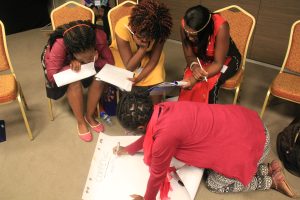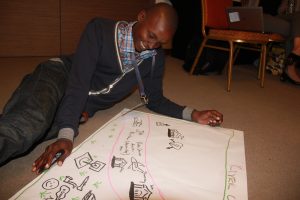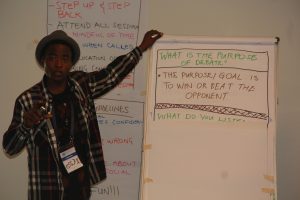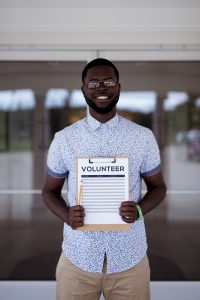WHO WE ARE
WHO WE ARE
 Our intervention
Our intervention
Renewed Hope Resilience Initiative
This groundbreaking initiative empowers Nigerian youths, particularly the unemployed and those affected by drug abuse, through vocational training programs that foster sustainable economic independence and prevent relapse. Launched in Kaduna, Abua, and Lagos in collaboration with NDLEA.
Project Background:
There is a demographic, democratic, and development imperative to meaningfully involve youths in issues of peace, security, and sustainable development. However, young people, who are meant to drive social change and development, are hindered by the menace of substance abuse. According to the National Drug Law Enforcement Agency (NDLEA), approximately 14.3 million Nigerians are involved with drug abuse, with an age range of 15 to 64 years old, and women being more involved in drug abuse than men. This alarming statistic highlights how substance abuse distracts and limits youths from driving sustainable development and nation-building. Women, who are influential in shaping future generations, are also deeply involved, exacerbating the situation.
While acknowledging the significant issue of substance misuse in Nigeria, it’s important to note that many individuals seek help upon realizing its negative impact on their lives. In 2021, approximately 8,000 drug users received counseling and rehabilitation, often through brief interventions. In the first five months of 2022, an additional 3,523 drug users were counseled and treated in NDLEA facilities. Despite these efforts, proper reintegration and transitioning of recovering addicts back into society remain critical challenges.
KASGPF is committed to properly transitioning and reintegrating recovering addicts back into society, ensuring they are meaningfully and profitably engaged to prevent relapse. The ultimate goal is to ensure they can live normal lives and build better futures. The foundation supports NDLEA’s post-rehabilitation engagements for youths who successfully undergo rehabilitation programs.
Recognizing that unemployment and drug abuse/addiction are major catalysts for increased crime rates and insecurity in Nigeria, the Renewed Hope Resilience Initiative was launched in collaboration with the NDLEA. This initiative addresses these issues by providing vocational training programs to unemployed youths and those affected by drug abuse, promoting sustainable economic independence and preventing relapse. The pilot states for the scheme are Lagos, Kano, and the FCT, Abuja, with plans to expand to other geopolitical zones based on the intervention’s effectiveness.
 Project Objectives:
Project Objectives:
- Engage youths, particularly the unemployed and those affected by drug abuse, through vocational training programs for sustainable economic independence and relapse prevention.
- Prevent more youths from substance abuse.
Project Activities:
- Identify funding sources and facilitate access to financial support at local and international levels for project execution.
- Train rehabilitated drug users on skills acquisition in approved institutions for gainful employment and reintegration into society.
- Collaborate with NDLEA in identifying and engaging vocational centers with proven track records.
NDLEA Project Role
- Recommend participants drawn from rehabilitated drug users in NDLEA centers.
- Participate at every level of the initiative to ensure success.
- Offer expert advice on identifying communities with high prevalence of drug abuse and the specific needs of rehabilitated persons.
- Collaborate with KASGPF in identifying and engaging vocational centers with proven track records.
 LGA Peace Committees Activation
LGA Peace Committees Activation
In a partnership with the Kaduna State Peace Commission, KASGPF activated various local peace committee to identify early warning signs.
 Drug Dependency and Addiction Research
Drug Dependency and Addiction Research
To tackle substance abuse and the increasing drug addiction, we initiated comprehensive research to gather data on the factors driving youth involvement in drug abuse, causes of relapse, and access to support for recovering addicts. This research aims to create an extensive database to understand the dynamics of drug use and addiction in our project areas.
Leadership, Peacebuilding, and Conflict Management Fellowship / Impact Action Fellowship
 Young people are vital in preventing violence and driving sustainable development. This fellowship program positions youths at the forefront of peacebuilding, equipping them with conflict management and peacebuilding and leadership skills to engage their peers in promoting peace, harmony, and sustainable development. We have trained over 100 young people and deployed them back to local communities. There is a demographic and democratic imperative to meaningfully involve youths in issues of peace and security, especially because we form the majority of the population and oftentimes part of the most affected negatively by violent conflict. Youths are used as foot soldiers in the perpetration of violence and are very susceptible to recruitment by extremist groups. However, young people have a duality of capacity which can be leveraged on for peacebuilding or for destructive purposes. Youths can play critical roles in security and peacebuilding but have largely remained unheard, unseen, and do not have the core skills. Advocating for youth inclusion should also make room for capacity building and hands-on engagement with youth leaders to be able to manage communal conflict and play strategic peacebuilding roles and activities that create impact as well as the necessary and promote sustainable development.
Young people are vital in preventing violence and driving sustainable development. This fellowship program positions youths at the forefront of peacebuilding, equipping them with conflict management and peacebuilding and leadership skills to engage their peers in promoting peace, harmony, and sustainable development. We have trained over 100 young people and deployed them back to local communities. There is a demographic and democratic imperative to meaningfully involve youths in issues of peace and security, especially because we form the majority of the population and oftentimes part of the most affected negatively by violent conflict. Youths are used as foot soldiers in the perpetration of violence and are very susceptible to recruitment by extremist groups. However, young people have a duality of capacity which can be leveraged on for peacebuilding or for destructive purposes. Youths can play critical roles in security and peacebuilding but have largely remained unheard, unseen, and do not have the core skills. Advocating for youth inclusion should also make room for capacity building and hands-on engagement with youth leaders to be able to manage communal conflict and play strategic peacebuilding roles and activities that create impact as well as the necessary and promote sustainable development.
Impact Action.

The impact action gathering is a 3 day capacity building training for young people on leadership, peacebuild, conflict management. Participants will be exposed to knowledge around defining and understanding conflict, analyzing conflict, communications during conflict and conflict management, leadership and vision, social innovation, youth centered peacebuilding framework, gender equity and social inclusion, environment and climate action, advocacy and leveraging digital campaign, as well as issues around shrinking civic spaces.
After a period of 6 months, a training of trainers and facilitation capacity building sessions will be conducted for the fellows making impact in local communities to enable them conduct a step down training in their local communities and recruit more young peacebuilders to continue to drive peacebuilding initiatives in local communities.
Our intervention
 Renewed Hope Resilience Initiative
Renewed Hope Resilience Initiative
This groundbreaking initiative empowers Nigerian youths, particularly the unemployed and those affected by drug abuse, through vocational training programs that foster sustainable economic independence and prevent relapse. Launched in Kaduna, Abua, and Lagos in collaboration with NDLEA.
Project Background:
There is a demographic, democratic, and development imperative to meaningfully involve youths in issues of peace, security, and sustainable development. However, young people, who are meant to drive social change and development, are hindered by the menace of substance abuse. According to the National Drug Law Enforcement Agency (NDLEA), approximately 14.3 million Nigerians are involved with drug abuse, with an age range of 15 to 64 years old, and women being more involved in drug abuse than men. This alarming statistic highlights how substance abuse distracts and limits youths from driving sustainable development and nation-building. Women, who are influential in shaping future generations, are also deeply involved, exacerbating the situation.
While acknowledging the significant issue of substance misuse in Nigeria, it’s important to note that many individuals seek help upon realizing its negative impact on their lives. In 2021, approximately 8,000 drug users received counseling and rehabilitation, often through brief interventions. In the first five months of 2022, an additional 3,523 drug users were counseled and treated in NDLEA facilities. Despite these efforts, proper reintegration and transitioning of recovering addicts back into society remain critical challenges.
KASGPF is committed to properly transitioning and reintegrating recovering addicts back into society, ensuring they are meaningfully and profitably engaged to prevent relapse. The ultimate goal is to ensure they can live normal lives and build better futures. The foundation supports NDLEA’s post-rehabilitation engagements for youths who successfully undergo rehabilitation programs.
Recognizing that unemployment and drug abuse/addiction are major catalysts for increased crime rates and insecurity in Nigeria, the Renewed Hope Resilience Initiative was launched in collaboration with the NDLEA. This initiative addresses these issues by providing vocational training programs to unemployed youths and those affected by drug abuse, promoting sustainable economic independence and preventing relapse. The pilot states for the scheme are Lagos, Kano, and the FCT, Abuja, with plans to expand to other geopolitical zones based on the intervention’s effectiveness.
 Project Objectives:
Project Objectives:
- Engage youths, particularly the unemployed and those affected by drug abuse, through vocational training programs for sustainable economic independence and relapse prevention.
- Prevent more youths from substance abuse.
Project Activities:
- Identify funding sources and facilitate access to financial support at local and international levels for project execution.
- Train rehabilitated drug users on skills acquisition in approved institutions for gainful employment and reintegration into society.
- Collaborate with NDLEA in identifying and engaging vocational centers with proven track records.
NDLEA Project Role
- Recommend participants drawn from rehabilitated drug users in NDLEA centers.
- Participate at every level of the initiative to ensure success.
- Offer expert advice on identifying communities with high prevalence of drug abuse and the specific needs of rehabilitated persons.
- Collaborate with KASGPF in identifying and engaging vocational centers with proven track records.
 LGA Peace Committees Activation
LGA Peace Committees Activation
In a partnership with the Kaduna State Peace Commission, KASGPF activated various local peace committee to identify early warning signs.
 Drug Dependency and Addiction Research
Drug Dependency and Addiction Research
To tackle substance abuse and the increasing drug addiction, we initiated comprehensive research to gather data on the factors driving youth involvement in drug abuse, causes of relapse, and access to support for recovering addicts. This research aims to create an extensive database to understand the dynamics of drug use and addiction in our project areas.

Leadership, Peacebuilding, and Conflict Management Fellowship / Impact Action Fellowship
Young people are vital in preventing violence and driving sustainable development. This fellowship program positions youths at the forefront of peacebuilding, equipping them with conflict management and peacebuilding and leadership skills to engage their peers in promoting peace, harmony, and sustainable development. We have trained over 100 young people and deployed them back to local communities. There is a demographic and democratic imperative to meaningfully involve youths in issues of peace and security, especially because we form the majority of the population and oftentimes part of the most affected negatively by violent conflict. Youths are used as foot soldiers in the perpetration of violence and are very susceptible to recruitment by extremist groups. However, young people have a duality of capacity which can be leveraged on for peacebuilding or for destructive purposes. Youths can play critical roles in security and peacebuilding but have largely remained unheard, unseen, and do not have the core skills. Advocating for youth inclusion should also make room for capacity building and hands-on engagement with youth leaders to be able to manage communal conflict and play strategic peacebuilding roles and activities that create impact as well as the necessary and promote sustainable development.

Impact Action
The impact action gathering is a 3 day capacity building training for young people on leadership, peacebuilding, conflict management. Participants will be exposed to knowledge around defining and understanding conflict, analyzing conflict, communications during conflict and conflict management, leadership and vision, social innovation, youth centered peacebuilding framework, gender equity and social inclusion, environment and climate action, advocacy and leveraging digital campaign, as well as issues around shrinking civic spaces.
After a period of 6 months, a training of trainers and facilitation capacity building sessions will be conducted for the fellows making impact in local communities to enable them conduct a step down training in their local communities and recruit more young peacebuilders to continue to drive peacebuilding initiatives in local communities.
